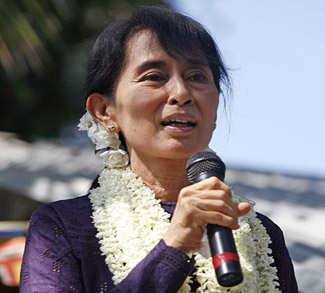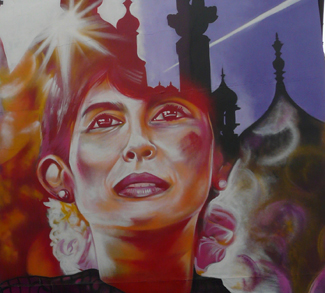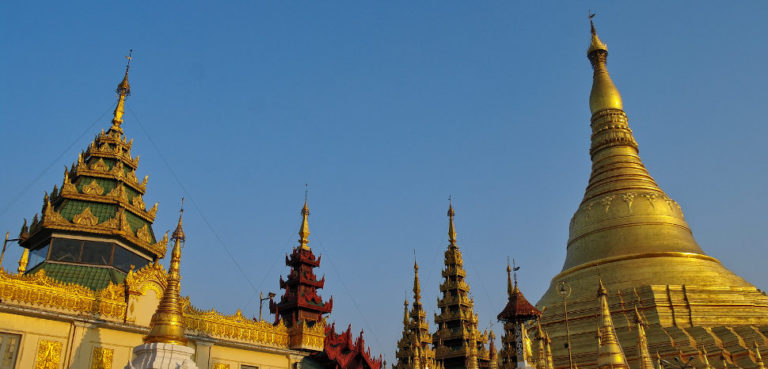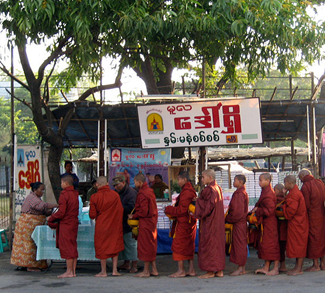Myanmar’s new parliament sat for the first time in February, ushering in a new era of democracy and signalling the end of more than 50 years of military rule. After Aung San Suu Kyi’s decades-long struggle for human rights and political reform in the Southeast Asian country, the National League for Democracy (NLD), was elected by a landslide majority last November, providing her with a powerful mandate to govern.
On the surface, it appears that the process of political change in Myanmar is surging forward at an unprecedented rate, with a more positive and prosperous future on the horizon. However, the new government has many significant political hurdles still to overcome before it can embark upon the more daunting task of tackling Myanmar’s complex social and economic problems. Whilst there are reasons for initial optimism, the legacy of Myanmar’s first democratically-elected government since the early 1960s will be defined by its reaction to the longer-term challenges which it faces: maintaining internal political stability and economic progress, reducing poverty, and resolving the country’s complex ethnic conflicts.
The NLD won November’s general election with a huge majority, claiming over 80% of all contested seats in parliament. The NLD took 364 seats in both houses, whilst the military-backed Union Solidarity Development Party (USDP) took just 40. However, 25% of total seats were already reserved for unelected military officials, meaning that the army still retains significant influence, and the NLD will have to work with them. So far, Aung San Suu Kyi has been careful not to antagonize the military – a sign that the transition process will be characterized my mediation and negotiation, rather than rapid and transformative change.
The most immediate task for the parliament is choosing a new president. However due to a constitutional clause introduced by the army in 2008 which prevents anyone with foreign children from holding the country’s highest office, Aung San Suu Kyi is barred from the position. Despite rumours that recent negotiations could lead to the removal of the clause, it appears that she will be forced to nominate a close ally for the presidency instead. Whilst this is an early stumbling block, Aung San Suu Kyi has insisted she will be “above the president,” making her the key decision-maker and effective head of the government. So far, the new arrangements appear to be working well and the overall signs are positive: the new president is set to be in place by the end of March, clearing the way for the government to get to work on the country’s real pressing issues.
The first major challenge for the NLD-led government will be to ensure that the atmosphere of political stability remains intact. In this respect, there is much at stake for Myanmar. The reform process in recent years has resulted in the lifting of international sanctions and an influx of foreign investment; therefore maintaining internal stability is key to ensuring that this opening-up process continues. Outgoing military leader Thein Sein has promised to “work peacefully in the transfer of power”; whilst Suu Kyi has already invited the parliamentary speaker, army chief and the outgoing president to discuss the formation of a national reconciliation government.
Despite this positive rhetoric offering an early sense of promise, the road ahead is likely to be bumpy. The civil-military relationship is set to remain at the centre of Burmese politics for years to come, with the military maintaining a high level of executive power. The constitution gives the army the right to appoint three key ministers: for defence, home affairs, and security affairs. As the military still controls these important departments, the NLD will be forced to work with them on the essential issues of internal policing and national security.
The importance of maintaining good relations with the military is particularly prevalent considering that Myanmar’s last democratically-elected government was overthrown in a military coup in 1962; whilst in 1990 the NLD also won an election, but the result was annulled by the military junta and Aung San Suu Kyi was placed under house arrest for much of the next 20 years. In addition, the current constitution still gives the army the right to take power in the event of a ‘national crisis’ as defined by the generals.
Due to the NLD’s huge level of popular support, the growth of civil society organizations and improved political awareness amongst the general population in recent years, another military coup is unlikely. However, the transition looks likely to progress slowly over many years, as attempts at more fast-paced change could push the army out of its comfort zone. In light of this, Aung San Suu Kyi may conclude that turbulent change is not needed, and that it is better to promote slow and steady progress in the interests of maintaining the country’s political stability.
In the medium to long-term, the government must address Myanmar’s complex economic and social challenges. For many years, the country has been beset by the acute development problems of poverty, malnourishment, high infant mortality rates, fragile education and healthcare systems, and a chronic lack of modern infrastructure. Maintaining the current rate of economic growth will be a key objective of the new parliament, with the economy growing at 8.5% in 2015 as a result of recent reforms and the influx of Foreign Direct Investment (FDI). Despite this, poverty and unemployment are endemic problems which must be tackled. Huge swathes of the country rely on agriculture for a large proportion of economic production, whilst faster development is held back by unequal electricity access, poor transport networks and an unskilled workforce. State corruption must also be combated, with Myanmar ranked 147th out of 158 countries in Transparency International’s 2015 corruption index.
Whilst the election of the NLD represents a tremendous moment of opportunity for Myanmar, the party is likely to face significant difficulties in transforming from a human-rights oriented campaign organization to a fully-functioning governing body. For years celebrated by the West as a world-renowned advocate of human rights and democracy, Aung San Suu Kyi will now face enhanced levels of scrutiny as a result of being in a position of power. This was already evident during the election campaign, in which the NLD did not field a single Muslim candidate and faced pressure to speak out more forcefully against the persecution of the minority Rohingya population, which has faced systematic discrimination and abuses at the hands of Myanmar’s security forces.
This brings us to the biggest challenge faced by the NLD: the resolution of long-standing ethnic tensions and conflict. Many states remain semi-war-zones, prone to ethnic conflict between the security forces and local armed groups. Overall, minority groups comprise up to 40% of Myanmar’s population of 52 million people, and most feel some degree of grievance or disadvantage. Outgoing President Thein Sein signed a national ceasefire agreement with 8 armed groups last October; however fighting continues on an almost daily basis in Kachin and Shan states. Among those that did sign the ceasefire agreement was the Karen National Union (KNU), one of Myanmar’s oldest revolutionary groups. However, the influential and powerful Kachin Independence Army (KIA) and United Wa State Army (UWSA) refused to sign the accord.
The UN estimates that in the past 4 years, 100,000 people have been internally displaced, whilst thousands more have fled across the borders into neighbouring Thailand, Laos and China. Many groups have a distinct lack of trust towards the military, so the new government represents an opportunity for progress. Ending these multiple conflicts could prove the key to enabling future economic prosperity across the country; therefore the new government has a huge incentive to reach out and push forward a renewed dialogue. It can also be argued that considering most of the conflict-torn regions voted heavily in favour of the NLD in November’s election, the party has a responsibility to increase engagement and further integrate disenfranchised groups into the political process.
Ending Myanmar’s ethnic conflicts, tacking anti-Muslim sentiment and improving the treatment of the Rohingya population will be viewed as an essential measure of the country’s progress in the eyes of the international community. However despite renewed hopes, these problems will remain difficult to resolve, as years of military rule have resulted in a legacy of social divisions and inter-communal distrust which will take years, if not decades to overcome.
In the wider geopolitical context, Myanmar also faces the strategic challenge of forging its place in the world as a democratic state. China has long been Myanmar’s closest ally, turning a blind eye to the human rights abuses of the ruling military junta in return for access to natural resources and favourable business contracts, such as the Myitsone Dam Project. In stark contrast, the US and many EU states have championed the pro-democracy cause, whilst maintaining strict economic sanctions against the regime. Aung San Suu Kyi therefore faces a difficult compromise, needing to strike a careful balance between keeping the military and regional-ally China on side, whilst at the same time maintaining steady progress in the advancement of democracy and human rights, in the face of mounting pressure from the domestic electorate and international supporters.
In an era of great hope and change, the outlook for Myanmar remains more positive than at any time in recent memory. However, the transition process is far from complete and many uncertainties remain. Economic difficulties and social divisions will loom large on the government’s agenda in the near future; but to even begin making progress on these issues, the country’s fragile internal political balance must be strengthened in order for stability to be maintained. As the new democratically-elected parliament begins its work with Aung San Suu Kyi at the forefront, rising expectations must countered by recognition of Myanmar’s myriad of political, economic, and social problems.




